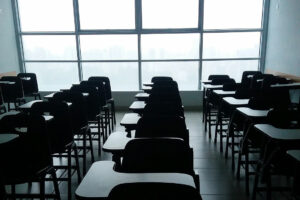By Justine Irish D. Tabile, Reporter
SEOUL — South Korea’s success was built on investing “more than any other country” in education, the chairman of the Korea Economic Cooperation Institute said.
Byung Koo Cho, also a visiting senior fellow at the Korea Development Institute, said at a lecture at the Global Knowledge and Development Center: “Education is important for any country. Even advanced European countries need education because the world changes, technology changes, so we need different people.”
“We cannot say the Korean education system is better than those of other countries, but we can say Korea invested more than any other country in education,” Mr. Cho said, noting that South Korea has consistently been out-investing every other rich country.
The Ministry of Education’s 2025 budget proposal was set at 104.9 trillion won, equivalent to 15.6% of the budget, up from 9.8 trillion won in 2024, or 14.6% of all spending.
“On average, Organisation for Economic Cooperation and Development (OECD) countries spend around 10% of their government budget on education,” he said.
Mr. Cho said South Korean literacy is almost 100%, after having been 80% illiterate in 1945.
He said South Korea’s main issue is the outsized funding for secondary education.
“We have to take this funding to tertiary education … to move that money is so difficult … But we have to do it; we have to transfer the funding from secondary to tertiary, (thereby changing) the educational systems,” he added.
The OECD has noted that South Korea “spends $21,476 per student from primary to post-secondary non-tertiary education, among the highest in the OECD,” it said.
“However, public expenditure per tertiary student is comparatively low at $6,617, less than half the OECD average of $15,102,” it added.
Mr. Cho said the impact of education on a country’s gross domestic product will take time to manifest.
“Investment in education has to be accompanied by the right strategies and giving (students) proper jobs, and that is the role of the government,” he said.
“Education, jobs and personal careers, and the national development path — we have to think of all of these together. But for everything, education is the key,” he added.
Though the Philippines is committed by law to make education its top spending priority, the impact of such investment is often eroded by corruption, according to George T. Barcelon, chairman of the Philippine Chamber of Commerce and Industry.
“There is a lot of corruption in this department. The corruption is also endemic in the history of our education system,” he said, adding that improvements are needed in policy and execution.
In the General Appropriations Act 2025, the Department of Education received P782 billion out of the P6.326-trillion budget for the year.
“Education has always been the biggest budget allocation for many years or decades,” Rizal Commercial Banking Corp. Chief Economist Michael L. Ricafort said via Viber.
However, he said that due to the government’s limited fiscal space, education needs more investment from the private sector.
“An investment approach, given the limited NG financial resources, would provide the greatest benefit to the economy in terms of faster economic growth and more development, especially in the countryside,” he said.
He added that investment in education could help maximize the productivity of the Philippine population, which at more than 114 million is the world’s 12th largest.
“Education is the big equalizer. It will lift more people and their families from poverty, especially the poorest of the poor,” he said.
However, he said investment in the sector should be paired with spending on nutrition to ensure that pupils complete their education and not drop out.
“There should also be a priority on STEM (Science, Technology, Engineering, and Mathematics) and other courses needed most by the employment market locally and globally,” he added.

